Iran’s Transitional Justice Explored In Conference In Norway
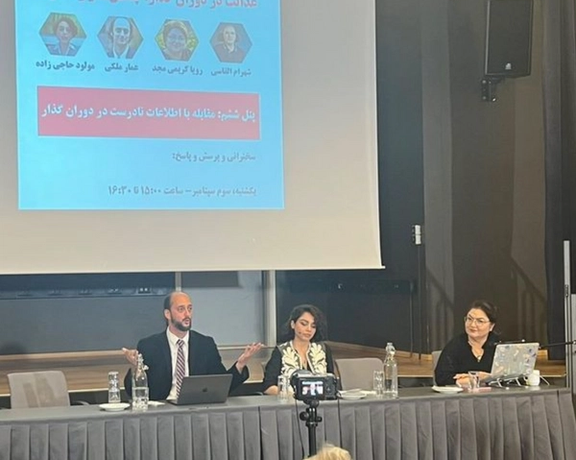
A conference focused on protecting the rights of Iranians has discussed economic and environmental justice, and misinformation during transitional periods.

A conference focused on protecting the rights of Iranians has discussed economic and environmental justice, and misinformation during transitional periods.
The second and final day of the conference, titled Iran: Transitional Justice, in Oslo brought together experts with specific experience in transitions from authoritarian regimes to democracies.
Kambiz Ghaffari, a journalist and a member of the Iran Human Rights Organization, which are hosts of the conference, shared insights with Iran International from the event, saying that the 22 speakers invited were not only Iranians but international specialists.
Srdjan Darmanovic, former Minister of Foreign Affairs of Montenegro, examined various facets of transitioning from authoritarian governance. He stressed that while discussions of transitions to democracy often evoke an "epic image" of Eastern Europe, the process can be considerably more challenging in some cases.
Nikahang Kowsar, a journalist and environmental analyst, discussed the exploitation of environmental resources during the Islamic Republic's rule. Speaking on a panel dedicated to environmental justice, Kowsar underscored the vital importance of responsible resource management especially water during transitional phases as mismanagement can lead to food insecurity and instability.
This is the third annual conference hosted with the aim to create debate and dialogue between citizens and experts on the challenges of establishing justice during the transitional period, and in parallel, to propose solutions by examining different transition models.
The conference's first day featured Javaid Rehman, a Pakistani-British legal scholar based in London and United Nations Special Rapporteur on Human Rights in Iran who is not allowed to enter the country. Speaking about his pursuit against human rights violations and state brutality, he said he would continue despite all resistance and push for Iran to transition to a democratic state.
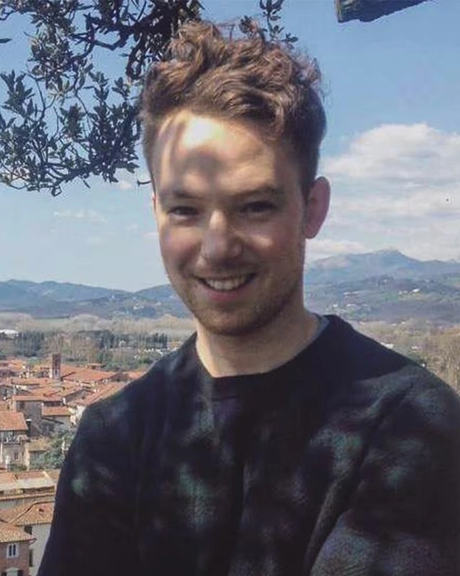
A Swedish citizen, part of the EU diplomatic corps, has been covertly detained in Iran for over 500 days as part of Iran's hostage diplomacy, reports The New York Times.
Johan Floderus, 33, who worked for the European Union's diplomatic corps, was arrested at Tehran airport in April 2022 as he prepared to depart the country after what was described as a private tourist trip with friends.
In July 2022, the Iranian government released a statement announcing that it had apprehended a Swedish national for espionage who was being held in Evin prison, however they did not disclose any further details.
The New York Times spoke to six individuals with first-hand knowledge of the case, who all confirmed that Floderus’ had nothing to do with any espionage claims.
The Swedish Ministry for Foreign Affairs said it would not comment on the details of the case, citing a need for secrecy. “A Swedish citizen — a man in his 30s — was detained in Iran in April 2022,” its press department said in a recent email. “The Ministry for Foreign Affairs and the Embassy of Sweden in Tehran are working on the case intensively.”
“We understand that there is interest in this matter, but in our assessment, it would complicate the handling of the case if the ministry were to publicly discuss its actions,” it added.
Floderus was detained when EU diplomats were hard at workto broker a nuclear deal between Iran and the United States. Two top EU foreign policy officials visited Tehran in mid-2022, while they kept his detention hidden from the public and European institutions. It is not clear to what extent the fact that one of their employees was held hostage impacted their mediating role.
Hannah Neuman, a German member of the European Parliament commented on the case on social media saying that parliament should have been informed about Floderus’ arrest, as well as attempts to secure his release and the impact on JCPOA negotiations.
She directly criticized the EU's policy of keeping Floderus’ arrest and detainment a secret as it may impact attempts to revive nuclear diplomacy. Others called for a policy re-think. “A serious recalibration of policy is needed,” said Kasra Aarabi, an academic, who took to social media to comment on the case. He further demanded the proscription of the IRGC and consolidated international action against the Iranian regime.
The European External Action Service, the diplomatic service for which Floderus works confirmed that they have been following the case very closely and that his arrest “underlines the very concerning tendency of Iranians to use EU nationals or Iranian dual nationals as pawns for political reasons." However, neither Swedish nor EU authorities have publicly discussed the situation, citing the need for confidentiality.
“This case has also to be seen in the context of the growing number of arbitrary detentions involving EU citizens,” added Nabila Massrali, a spokeswoman for the EU bloc’s diplomatic body. “We have used and will continue to use every opportunity to raise the issue with the Iranian authorities to obtain the release of all arbitrarily detained EU citizens.”
The arrest of Floderus follows a pattern of Iran detaining dual nationals and foreigners on dubious charges to use them as bargaining chips for prisoner exchanges or to extract concessions and funds.
A recent deal saw five American prisoners being released in return for freeing up $6bn of frozen Iranian funds in South Korea, which puts an approximate price of $1.2bn per head.
Relations between Iran and Sweden have soured recently, notably with the sentencing of a former senior Iranian judicial official, Hamid Nouri, to life in prison in Sweden for war crimes committed in Iran. Iran has escalated pressure on Sweden in response.
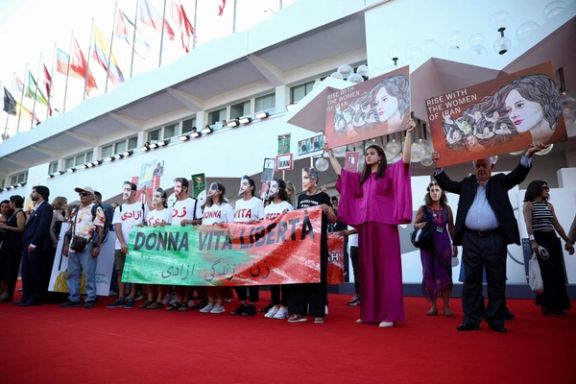
A movie about the Islamic Republic’s pressures on Iranian athletes not to face Israeli competitors is the first production co-directed by Iranian and Israeli filmmakers.
The film, which premiered at the Venice Film Festival, had to be shot in secret to prevent possible interference by Tehran, directors Zar Amir Ebrahimi and Guy Nattiv told Reuters on Sunday.
"Tatami", a tense thriller centered on a world judo championship, received a standing ovation during its premier at the weekend. The film takes place over the course of the single day of competition as an Iranian judoka champion, played by Farsi-speaking US actress Arienne Mandi, is ordered to fake an injury to avoid a possible match-up with an Israeli competitor, a scenario that has happened to several Iranian athletes in real life.
Amir Ebrahimi and Nattiv shot the movie in Georgia, a country Iranians can easily visit. They stayed in separate hotels, spoke English and did not let on that they were making such a politically charged film.
"I knew there are many Iranians there, so we were trying to keep it calm and secret," said Amir Ebrahimi, who is an award-winning actress who fled Iran in 2008.
Iran does not recognize Israel's right to exist and has forced athletes into intentionally losing matches, forfeiting games, or claiming injuries to evade encounters with Israeli competitors.
banned its athletes from competing against Israelis in an incident that inspired "Tatami", the International Judo Federation in 2021 gave Iran a four-year ban for pressuring one of its fighters not to face an Israeli.
Last week, a weightlifter was banned from the sport for life after posing for a photograph with an Israeli at the World Master Championships in Poland.
Over the past few years, approximately 30 Iranian athletes have defected from national teams and sought asylum in foreign nations.
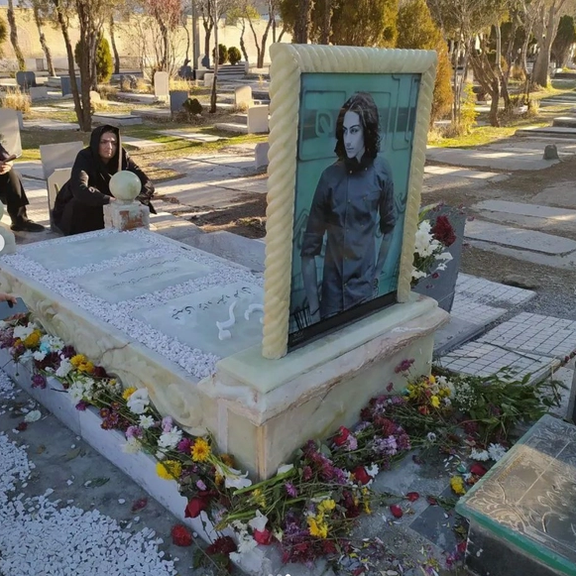
The Iranian regime has imposed severe sentences on protesters detained during nationwide rallies and several others who gathered at the grave of a deceased protester.
In Arak, the judiciary sentenced eight people to approximately seven years in prison and over 70 lashes each on charges of "insulting sanctities, disrupting public order, and promoting propaganda against the system" for their presence at the gravesite of Mehrshad Shahidinejad during a religious holiday.
These individuals were arrested while gathering at Shahidinejad's grave on Tasu'a, a Shiite holiday that precedes the death anniversary of Hussein ibn Ali, the third Shiite imam and the grandson of the Islamic prophet Muhammad. Regime agents released a video clip of the gathering and portrayed it as disrespectful to the Shiite ritual.
In line with the regime's strategy to intimidate and humiliate protesters, the judge emphasized that "the flogging sentences for these individuals must be carried out publicly, following Friday prayers at Arak's main prayer site."
Mehrshad Shahidinejad, a 20-year-old chef, was arrested in October during anti-government rallies and died after being beaten with a baton at the Revolutionary Guard Intelligence's detention center in the city. He soon became an icon of the Women, Life, Freedom protests.
In another case, six protesters arrested in Tabriz were collectively sentenced to 18 years in prison and various fines. Pejman Eslami and Bagher Taji Ahmadifard each received five-year sentences, while the remaining four were sentenced to two years in prison and fines totaling around $11,000. The average Iranian's monthly salary is approximately $150 to $200.
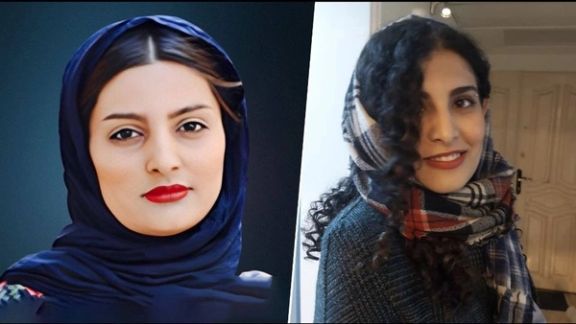
Amid intensified pressure on Iranian journalists, the regime has handed down a suspended three-year prison sentence to two more reporters.
Negin Bagheri and Elanaz Mohammadi were charged with "assembly and collusion" by a revolutionary court in Tehran.
Amir Raeesian, Mohammadi's attorney, confirmed the sentence on Saturday, explaining that the two journalists will serve a fraction of their sentence, and the remainder will be suspended for five years.
According to Raisian, the two were cleared of charges related to collaboration with hostile foreign entities. The court cited a lack of evidence and grounds for the charges, ultimately leading to their acquittal.
The reporters have also been subjected to a five-year "travel ban" and are prohibited from engaging in "professional activities related to the committed crime" or having interactions with individuals active in foreign media outlets.
Elnaz Mohammadi, a reporter for the reformist Ham-Mihan newspaper, is the sister of Elaheh Mohammadi, a journalist who was among the first to report Mahsa Amini's death in custody in September 2022. She was arrested and jailed alongside Niloufar Hamedi. The pair have been detained for 300 days because the regime held them responsible for the nationwide protests that erupted after Amini’s death.
Elnaz was detained in February but was released on bail about a week later. Bagheri, a journalist and women's rights activist, was also released on bail after being summoned, charged, and temporarily detained in February.
Mahsa Amini's death sparked nationwide protests that led to the Women, Life, Freedom movement, the boldest challenge the Islamic Republic has faced since its establishment.
In August, the chairman of the board of directors of the Tehran Journalists' Guild stated that more than one hundred reporters and journalists have been arrested following the protests, emphasizing that the "dark era of journalism" in Iran continues."

More than 300 reform activists and figures in Iran have issued a statement demanding a referendum on the future political shape of the country.
Expressing support for the "Woman, Life, Freedom" movement and those killed and imprisoned by the regime, the activists pointed out, "We repeatedly remind that the structure of religious authoritarianism not only undermines our national foundations but also propels us towards future upheavals and movements towards rebellion."
Two weeks before the anniversary of Iranian protests, the pro-reform individuals representing a more radical posture than former President Mohammad Khatami demanded a referendum to make "structural changes" in the Islamic Republic political system.
Iranians expect renewed protests on the anniversary of the "Woman, Life, Freedom" movement later this month, and the signatories of the statement, without explicitly calling for demonstrations, voiced support for young dissidents. "Now, we express our solidarity once again with all the families affected by the protests of the past year and hold the uprising of young people seeking freedom and equality, especially the resistance of justice-seeking and freedom-loving women, in high regard," they emphasized.
"Therefore, structural change and a referendum to establish a government derived from the people's vote will remain a right that we continue to advocate so that Iran no longer suffers beyond what it already has," they said.
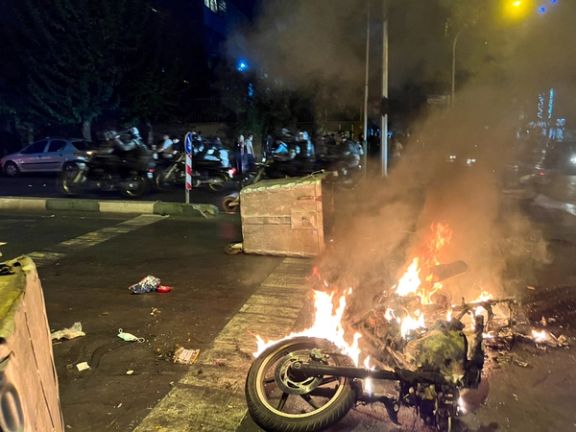
Iran's reformists, who advocate for a more humane version of the Islamic Republic as a form of government, have been driven out of power by hardliners in the past three years. Even moderate conservatives, such as former parliament speaker Ali Larijani, have been pushed into retirement from public office.
When nationwide protests began in September 2022, after the death in custody of Mahsa Amini, reformists were initially ambivalent toward the movement, which appeared to be more radical than simply demanding reforms within the Islamic Republic system. Prominent reformists adopted contradictory postures, with many rejecting regime change as the desirable goal of the protests.
On November 14, two reform figures, former President Mohammad Khatami (1997-2005) and former vice president Massoumeh Ebtekar, broke their silence after more than 8 weeks of protests about the possible demise of the regime and voiced their opposition to dramatic changes in Iran.
Khatami revealed his opposition to regime change by saying that it was "neither possible nor desirable." Nonetheless, he warned that if the current state of affairs continues, the ground is paved for a looming social collapse.
The divergence of opinions among reformists sharpened in February when former prime minister and Green Movement Leader Mir-Hossein Mousavi issued a statement demanding "fundamental change" based on the "Woman, Life, Freedom" movement and constitutional revisions. Mousavi, who has been under house arrest since 2011, said in his statement that the people have given up hope for reforms and they demand widespread change.
Although Mousavi did not openly call for regime change, the demands he put forward could lead to a new and more democratic political system. Ironically, his statement implicitly repeated what exiled Prince Reza Pahlavi has been saying for years, and other opposition figures were demanding during the protests. Mousavi was a pre-imminent Islamic revolutionary in the 1980s.
Khatami, as the symbolic father of the reform movement, nevertheless has maintained his more loyalist position, asking for reforms, while parliamentary elections in March put average reformist figures in a quandary of whether to announce their candidacy or boycott what, in most probability, will turn out to be another engineered vote by the ruling hardliners.
The 300 mostly reformist figures who have signed the latest statement appear to have adopted a position closer to Mousavi, by calling for a referendum.






